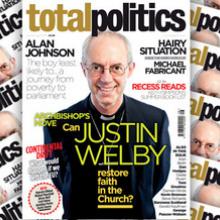Economic Justice
The House of Representatives on Thursday evening narrowly passed a plan that cuts about $40 billion* from the Supplemental Nutrition Assistance Program (SNAP), or food stamps program. The Congressional Budget Office estimates that the move will push nearly 4 million low-income people off of the program in 2014. USA Today reports:
"The House voted 217-210 for the bill that cuts nearly twice as much from food stamps as a bill the House rejected in June. It is also far more than a Senate measure passed earlier this year that would trim about $4.5 billion in spending. The bill failed to draw the support of a single Democrat, many of whom have said the steep cuts would erode a key safety net depended upon by families with children, seniors, veterans and people looking for work."
Earlier on Thursday, Sojourners President Jim Wallis condemned the then-proposed cuts, saying, "These same politicians are not willing to go to where the real money is: the Pentagon budget, which everyone knows to be the most wasteful in government spending, or the myriad subsidies to corporations, including agribusiness subsides to members of Congress who will be voting to cut SNAP for the poor. ... They are going after cuts to the poor and hungry people because they think it is politically safe to do so. So let’s call that what it is: moral hypocrisy."
Check back with Sojourners for details on how your congressperson voted.
If you know the facts and faces of the hungry families that are helped by SNAP, I believe it is a moral and even religious problem to vote to cut them. The Bible clearly says that governmental authority includes the protection of the poor in particular, and instructs political rulers to promote their well-being. So the argument that the poor should just be left to churches and private charity is an unbiblical argument. I would be happy to debate that with any of our conservative Congressmen who keep telling our churches that we are the only ones who should care for the poor. To vote against feeding hungry people is un-Christian, un-Jewish, and goes against any moral inclination, religious or
Finally, for politicians to defend these SNAP cuts because of our need to cut spending generally is un-credible and incredible.
These same politicians are not willing to go to where the real money is: the Pentagon budget, which everyone knows to be the most wasteful in government, or the myriad subsidies to corporations, including agribusiness subsides to members of Congress who will be voting to cut SNAP for the poor.
Tea Party-elected Rep. Stephen Fincher, (R-Tenn.), who likes to bolster his anti-poor rhetoric with misused Bible verses, collected $3.5 million in farm subsidies between 1999 and 2012, according to the New York Times. Fincher is helping to lead the effort to cut food stamps to working families with children by illogically quoting: “The one who is unwilling to work should not eat,” all the while collecting millions of dollars in agricultural subsidies. Congressman Fincher's position is hypocritical — and it's this kind of hypocrisy that makes Christians look bad and turns young people away from the church.
You see, for many House conservatives this isn't really about SNAP, but about their opposition to the idea that as a society we have the responsibility to care for each other, even during the hard times or when resources are few. Conservatives know their ideas for privatizing Social Security or cutting funding to Medicare and Medicaid are politically unpopular, but their ideology of individualism that borders on social Darwinism remains unchanged. SNAP is the perfect target for them. The image of what it does and whom it serves has been widely distorted by the media, while the people who benefit from it have little influence in the halls of Congress and pose little risk to the political careers of Republican members.
House leaders are proposing a massive cut to SNAP (Supplemental Nutrition Assistance Program), America’s frontrunner in combatting hunger. This new proposal consists of a $40 billion reduction in funding, and SNAP households across the board would be feeling the pinch beginning as soon as November.
Potential cuts reveal stark and sobering statistics that millions of Americans would face:
- The average benefit per person, per meal would decrease to below $1.40, dangerously low to maintain the minimum standards of a healthy diet;
- 210,000 kids would be cut from free school meals;
- SNAP cuts would be the equivalent of taking away 21 meals per month from a four-person household; and
- 170,000 veterans would lose out on food benefits.
We worry now, but we’ve been concerned about the economy for a long time. The economic recovery from the recession in America has been slower than we hoped, and people continue to suffer from the collapse of so many industries and jobs and safety nets. Much of the pain seems new for large swaths of the American population. But in reality, we’ve been worrying about money forever.
The August employment report from the Bureau of Labor Statistics shows a slight decline in the unemployment rate (down to 7.3 percent from 7.4 percent in July), according to Businessweek. But the drop is largely attributed to a reduction in the workforce of about 300,000. What’s more, the participation rate (number of people working or looking for work compared to the total working age population) fell from 63.4 percent to 63.2 percent, the lowest since 1978. The National Employment Law Project noted that much of the job growth in August was in retail and food service, industries that generally offer lower paying and part-time jobs.
Even though a growing number of economists see modest and encouraging signs in the recession recovery, the slow growth continues to cause trouble for many Americans. Businessweek writer, Matthew Philips, even questioned whether the economy might be “stuck in second gear” without hope of a more robust “third gear” to propel the recovery forward.
The economic health of the nation has long been a concern to people of faith, because we care for the poor, and poverty has been a persistent problem in rural area and urban centers alike. What’s more, we know there are people of all income levels who struggle with money and possessions, and we are concerned about this, too. We worry that people have enough to eat and that wealth not corrupt our best desires and intentions.
About a year ago, I wrote about my family participating in the Supplemental Nutrition Assistance Program (SNAP) Challenge, which encourages families to try to live on the equivalent of SNAP assistance (food stamps) for one week. It was a growing experience for all of us, and we actually fell short of our intended goal. It turns out that it’s not easy to feed a family of four well — especially without great time and effort — on less than $20 a day.
In looking back on that experience, a number of myths come to mind that I’ve heard from folks about SNAP, which I thought I’d share here.
The income gap in the U.S. is as wide as it has been in almost 100 years, according to a new study by UC Berkeley, the Paris School of Economics, and Oxford University. The study, based on Internal Revenue Service statistics, reports that although the Great Recession hit the top 1 percent hard, the wealthy recovered more quickly than other income groups. The L.A. Times reports:
The 1929 stock market crash that preceded the Great Depression, followed by World War II, reduced an earlier national income gap for decades. But it began to grow again in the 1970s, and has widened since.
Saez attributes the trend not just to technology and job outsourcing, but to the reduced power of progressive tax policies and unions, along with "changing social norms regarding pay inequality."
Read more here.
There is no longer a war on hunger in this country.
There is no longer a war on poverty.
There is a war on the hungry.
There is a war on the poor.
It is being waged all over the country with the most recent — and visible — battle coming from Raleigh, N.C., and the now-viral incident with the Rev. Hugh Hollowell’s Love Wins ministries.
It’s ironic, really.
Conservatives love to tell folks that the best way to end poverty, homelessness, and need in our country is through the work and generosity of private individuals and private donations, not through government programs.
The answer, they say, is charity.
Yet in a stroke of cruel hypocrisy, when charities actually address these issues in real life, they aren’t commended for their work.
Rather, they are threatened with arrest.
I got a glimpse into the politics of scorn this week.
The visual was a photo accompanying a New York Times article on rental properties in Memphis, Tenn. The article itself seemed innocuous, about how foreclosed homes are being scooped up by outside investors and turned into rentals.
The photo, however, was troubling. It showed a young man lazing in a large chair while his two children stared numbly at a television screen and his wife tapped away on a cell phone.
I have no clue into this family’s character. But the visual screamed: “Idle! Lazy!”
As with essentially any issue, you can find Christians with opinions all across the board regarding educational policy in the United States. I am not going to pretend there is one “right” political position for Christians to take or that I know all of the factors individuals consider when making choices about their children’s schooling. However, as a Christian, former public school student, and a public school teacher, there are three requests I would make of Christians regarding their conversations and their actions when it comes to education.
1. Please focus your efforts on issues of significance.
In public schools, the loudest Christian voices revolve around issues like the debate about removing “under God” from the Pledge of Allegiance (a phrase added to the pledge in 1954, a pledge that itself was only formally adopted by Congress in 1942). Another hot-button issue involves prayer in schools. When I have participated in “See You at the Pole” events as a student and as a teacher, I felt more like the hypocrite Jesus described praying loudly on a street corner than Daniel refusing to alter his by-the-open-window prayer routine.
Mary Priniski wrote in the August 2013 Sojourners magazine about churches responding in solidarity with garment workers, disproportionately women, after the terrible fires in Bangladesh’s garment factories. Now, a global church alliance has been established. Ekklesia reports:
[The alliance] provides an action plan for grassroots campaigning, and a letter for consumers to send to their retailers demanding improvements to the pay and working conditions of garment workers. Real-life stories from garment workers in Bangladesh also highlight the oppression they face and the struggle to survive.
I am not shy about using the saltshaker, and neither I nor anyone else in my family has any sort of problem with blood pressure. That’s because we mostly don’t eat things that come out of packages or from fast-food places (where someone else takes them out of packages), and the salt that is a problem in the North American diet doesn’t come from the saltshaker but from the extreme levels of sodium in packaged foods.
But you will never hear Michelle Obama say that.
There was a similar unutterability to everything having to do with AIDS back in the day. Even when scientists had a fairly clear understanding of the nature of the threat and how it was spread, most “official” speech tended toward a hedging: “we don’t know what causes it; we don’t want to say what’s causing it …” Even today people don’t get tested because they don’t want to know, even though getting tested obviously doesn’t give you the virus — it merely points out that it is there. It seems to point to so much more, though.
If, through broader networks of power, injustice is linked, it is no less true that injustice is encountered locally in neighborhood markets, schools, churches, and even corner fast-food joints. Today it is useful to begin not with the unseen oppressive power networks in our society but with their effects on those closest to us. Just ask the single parent serving dollar ice cream at a favorite fast-food hangout if he or she would like better hourly wages.
While fast food CEOs average a daily salary of $25,000, workers at fast-food companies in New York City make only 25 percent of the money they need to survive. Single parents earning the current federal minimum wage of $7.25 an hour are, as Jillian Berman of the Huffington Post describes, not able to survive even in America’s cheapest counties. The Wider Opportunities for Women estimates that women are 50 percent more likely than men to earn the minimum wage. Compound this with the status of single motherhood and the needs of the household intensify exponentially.
Dependent on minimum wages are children, who like any other child in the U.S., deserve access to healthy food, clothing, affordable shelter, and descent education. Within the current reconfigurations taking place in the U.S. economy, the new modes of production continue to privilege those like the CEOs of fast-food companies. Yet, as Isaiah’s ballad reminds us, these wider realities have a local impact on the everyday friend, who routinely rises every morning to try and make ends meet on meager wages. The current vineyard of the fast-food industry has not stopped producing sour grapes, which is the massive sale of cheap empty calories at the wage of $7.25 an hour.
My dad used to tell a joke from the pulpit, back when “damn” was a much stronger word in evangelical/fundamentalist circles than it is now.
It went roughly like this:
“Millions of people die every day from preventable causes without ever having heard about Jesus’ love, and most of you don’t give a damn, and most of you are probably more worried about the fact that I said ‘damn’ than about the fact that millions of people die daily from preventable causes without ever having heard about Jesus’ love.”
I have a new post up at her.meneutics, Christianity Today’s women’s blog that, quite frankly, I don’t expect too many people to read.
It’s about how it’s perfectly legal in most states to shackle pregnant women while they are in labor.
[T]HE MAJORITY OF THE men and women of our time continue to live daily in situations of insecurity, with dire consequences. ... One cause of this situation, in my opinion, is in our relationship with money, and our acceptance of its power over ourselves and our society. Consequently the financial crisis which we are experiencing makes us forget that its ultimate origin is to be found in a profound human crisis, in the denial of the primacy of human beings. We have created new idols. The worship of the golden calf of old (Exodus 32:15-34) has found a new and heartless image in the cult of money and the dictatorship of an economy which is faceless and lacking any truly humane goal. The worldwide financial and economic crisis seems to highlight the distortions and above all the gravely deficient human perspective, which reduces [people] to one of [their] needs alone, namely, consumption. Worse yet, human beings themselves are nowadays considered as consumer goods which can be used and thrown away. We have begun a throw- away culture. This tendency is seen on the level of individuals and whole societies; and it is being promoted ...
While the income of a minority is increasing exponentially, that of the majority is crumbling. This imbalance results from ideologies that uphold the absolute autonomy of markets and financial speculation, and thus deny the right of control to States, which are themselves charged with providing for the common good. ... I encourage the financial experts and the political leaders of your countries to consider the words of Saint John Chrysostom: “Not to share one’s goods with the poor is to rob them and to deprive them of life. It is not our goods that we possess, but theirs.”
THE PHRASE “a revolution of rising expectations” is now part of the social science literature. When people who are not oppressed have a belief that life is getting better as economies improve, their expectations often outstrip the pace of actual change. Those rising expectations lead to unrest as demands for improvement continue to grow.
This summer we have seen that play out in several countries. As living standards increase, people are less likely to tolerate corrupt and inefficient governments. Washington Post reporters Anthony Faiola and Paula Moura recently wrote, “One small incident has ignited the fuse in societies that, linked by social media and years of improved living standards across the developing world, are now demanding more from their democracies and governments.”
In Turkey, it was the government’s plans to destroy the only public green space in the heart of Istanbul, a park that was to be replaced with a shopping mall. Protests against the plan soon grew into broader concerns about what is seen as increasingly authoritarian rule by Prime Minister Recep Tayyip Erdogan. They turned violent when peaceful demonstrators were attacked by police, and ultimately an Istanbul court ruled against the plan, although it is not finally settled.
In Brazil, protests that began over a proposed rise in bus fares brought hundreds of thousands of people into the streets. The protests soon escalated into opposition to the large amounts of money the government is investing in facilities for the 2014 World Cup and the 2016 Olympics, while neglecting basic health care and education. President Dilma Rousseff has promised political reforms and increased spending on public transportation and other social needs.
Sister Simone Campbell, the face of the famous “Nuns on the Bus” tours, and Rep. Paul Ryan, the brains behind the House Republicans’ budget-cutting plans, have for more than a year represented diametrically opposed camps on how to apply Catholic social teaching to American fiscal policy.
At a House Budget Committee hearing on Wednesday, the two Catholics had a chance to square off as the sister testified before Ryan’s committee about hardship in America as the nation nears the 50th anniversary of President Johnson’s 1964 declaration of the “War on Poverty.”
Yet there were few fireworks nor much in the way of theological debate, as Ryan, R-Wis., did not go out of his way to champion the GOP budget plan that bears his name. That plan focuses on cutting social programs that Campbell says are key to supporting struggling Americans and also boosting the economy.
Archbishop of Canterbury Justin Welby said he was embarrassed and irritated following revelations that the Church of England has invested millions of pounds in a company that financially backs England’s leading payday lending company, Wonga.
Welby told the BBC: “We must find out why this happened and then make sure that it never happens again.”
The Financial Times broke the news that the Church of England invested several million pounds in Accel Partners, the U.S. venture capital company that led to the launch of Wonga, which dominates the 2 billion pound payday lending market in England. Wonga charges annual percentage rates of more than 5,000 percent.
Jesus calls us to help the poor. That is a point that few would debate. One key indicator of our obedience is how we treat the poor and vulnerable among us. Where we fall into debate is how to do it the most effectively.
One thing that gets lost in the rhetoric is that many of the solutions we have are already effective — they just need to be improved. And we have plenty of ideas that already help lift families out of poverty while encouraging them to work. Sounds perfect, right?
The Earned Income Tax Credit (EITC) is one such program. It provides a tax credit based on how much income a worker takes in — the more income they take in, the more benefit they get, up to a maximum point when it starts to phase out. This gives working people incentive to keep working rather than rely on assistance alone.
According to an aide connected to the Democratic Party, bipartisan senators reached a deal Wednesday that would offer undergraduate students a lower interest rate of 3.85 percent on student loans, up until the year 2015. Revealing this information to USA Today prior to the official vote, sources confirmed that both parties are working towards lowering students costs. USA Today reports:
The bipartisan agreement is likely to be the final in a string of efforts that have emerged from near constant work to undo a rate hike that took hold for subsidized Stafford loans on July 1. Rates for new subsidized Stafford loans doubled from 3.4% to 6.8%, adding roughly $2,600 to students' education costs.
Read more here.
The number of those who’ve benefitted from the Supplemental Nutrition Assistance Program (SNAP) has increased nearly seven percent from 8.7 in 2007 to 15.2 in its most recent study. Despite the economic challenges America has faced over the past several years, the Houses’ decision to do away with food stamps has not only caused controversy between the House and the Senate but has caused controversy between the government and the American people. The New York Times reports:
Something terrible has happened to the soul of the Republican Party. We’ve gone beyond bad economic doctrine. We’ve even gone beyond selfishness and special interests. At this point we’re talking about a state of mind that takes positive glee in inflicting further suffering on the already miserable.
Read more here.














